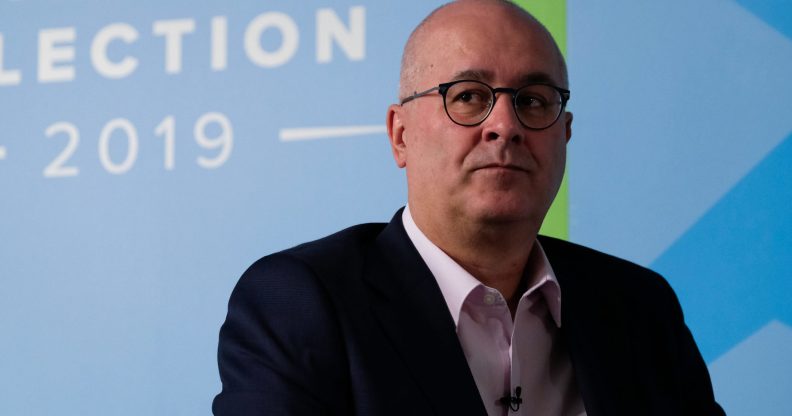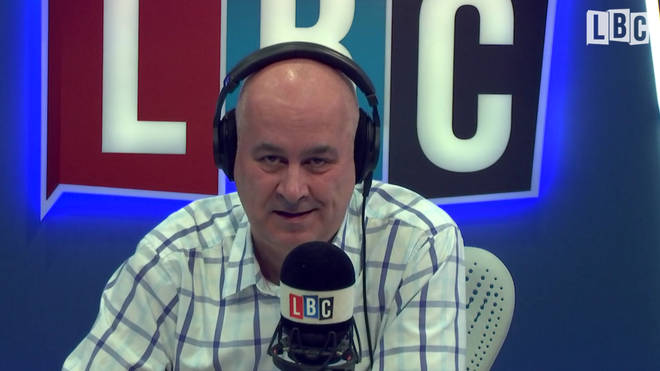Prolific gay broadcaster Iain Dale bravely revisits his experience of surviving sexual assault: ‘I doubt he even remembers it’

Dale was the first out gay man to run as a Tory in a general election. Getty/Ian Forsyth)
Dale was the first out gay man to run as a Tory in a general election. Getty/Ian Forsyth)
A regular voice on LBC for a decade, prolific gay broadcaster and political pundit Iain Dale is used to being a sympathetic ear for callers pouring out their most intimate thoughts, feelings and experiences. Now, taken from his new book Why Can’t We All Just Get Along: Shout Less. Listen More, available to buy now, he’s decided to open up about his own trauma, describing his experience surviving sexual assault.
I may have “imposter syndrome” about my writing ability, but it disappears when I have a microphone in front of my mouth, especially when talking about deeply personal subjects. Finding the right words is something we all struggle with, and that’s nowhere more evident than when people ring in to a radio show.
If you think about it, it’s a weird thing to do. I’m always astonished that anyone does so, to be frank. Most people like keeping themselves to themselves, so when anyone rings in to my show I take it as a huge compliment. It’s why I usually try to make a fuss of a ‘first-time caller’.
The fact that they’ve bothered to pick up the phone means that something I’ve said has triggered them to do so, and this is especially the case when I talk about emotional subjects like abortion, rape, addiction or mental health.
On one of my first shows on LBC back in 2010, I covered a story about the Advertising Standards Authority ruling in favour of Channel 4’s decision to screen adverts for the Marie Stopes pregnancy/abortion advisory clinics.
First of all, I talked to Tory MP Nadine Dorries, who took the view that these adverts should not appear on TV, and then to Simon Blake from the Brook advisory service. He supported their right to be shown. And then it was on to the calls. What I hadn’t bargained on was the three women who phoned in, each with a different but equally heart-breaking story about how they had come to decide to have an abortion, and how it had affected their lives.

Iain Dale has been a regular on LBC since 2010. (LBC)
Talking to any woman in private about their traumas would be awkward enough, but doing it on national radio was a real learning experience. I tried to let them talk with little interruption, partly because any significant intervention from me would have been invidious, but also because they clearly wanted to tell LBC listeners how their own experience had impacted on their lives.
One of the callers bitterly regretted her decision to have an abortion and described how she thinks about it every day, 20 years later. Carol from Harrow was the last caller and her story almost reduced me to tears. Indeed, she was clearly finding it difficult to hold it together herself. I hated having to cut her off as we had to go to the 8 o’clock news. We phoned her back to check she was OK and she asked my producer to tell me that she had no regrets about the abortion she had. It was the right thing to do at the time, but she now has two very healthy children and she wanted me to know she was very happy. Another lump-in-throat moment.
I remember after that show discussing what had happened with the then managing editor of LBC, Jonathan Richards. I expressed my astonishment that people would talk about such personal issues on live radio, and wondered if I had handled the issue properly. He told me people would always want to talk to me, because I let them speak, I didn’t constantly interrupt and I had a quiet, reassuring manner. I’ve never forgotten that.
I know now that I enjoy this sort of ‘baring your soul’ phone-in far more than my usual political fare. In the end it’s all about listening and empathising with the caller and using the appropriate language, and not being afraid to admit when you don’t know what to say.
“Let’s got to Anne in Enfield. Anne, what would you like to tell me?” It turned out to be quite a call.
We were conducting a phone-in on rape and its long-term psychological effects. Anne proceeded to tell me something she had never told a living soul, even her husband.
Many years earlier, she had been raped at a family wedding, by a family member. As she was speaking, I could tell how difficult she was finding it to continue. I stepped in to reassure her that by telling her story she was helping others who had suffered the same experience and felt that they were the only ones. She explained that, although it had happened many years ago, she still thinks of it every day.
“This giant cloud hangs over me,” I remember her saying. I found it fascinating that she was calling in to talk to me about it, yet hadn’t told anyone else. Ever. The call ended and I wished her well. The next night she phoned in again. She asked to be put through to me, but my producer Laura explained we were talking about a different subject. In a break, Laura told me Anne had wanted to speak to me again. “Put her on just before the end of the hour,” I said. Somehow I sensed it was important to her.
When she came on the line, her first words were, “Iain, I’ve told my husband what happened.” I gulped slightly and asked her how it had gone, almost praying it had been OK. “Iain, I feel I can see blue sky again!” she exclaimed. We both teared up at that point.
Not long afterwards I conducted a phone-in on male rape, by which I mean male-on-male rape. In all honesty, I wasn’t sure any man would phone me and talk about it, for obvious reasons. I shouldn’t have worried. Within minutes the phone lines were buzzing. It was an hour in which I should have been honest and made an admission myself. I could have revealed that I too was once the victim of a sexual assault, which could have turned into something far worse. It’s not something I have spoken about in public before, but perhaps I should have done.
It wasn’t that I was ashamed of what had happened, I suppose I just wimped out. Until, in early 2019, I was on CNN Talk with Bonnie Greer discussing the sexual assault allegations made against US Supreme Court nominee Brett Kavanaugh by Christine Blasey Ford. Bonnie had written in the New European newspaper about a date rape she suffered 40 years earlier. She was asked about her experience by the programme’s host, Max Foster, and, as part of her response, she emphasised that sexual assault is something that happens to men as well as women, and that it was important men talked about it. So I did.
It was the other guy who I should have been blaming, not myself.
I think it is often very difficult for victims of sexual crimes to come forward. This is especially true when people believe there is no prospect of a conviction. They also blame themselves. There’s a feeling of shame involved. Embarrassment. “What will people think?”
Back in the late 1980s and early 1990s, I lived in Walthamstow. One night I met a guy and went back to his flat. His room was disgusting. Clothes all over the place and a mattress on the floor. Still, I wasn’t there to judge his tidiness habits. It soon became evident to me that he was blind drunk. Almost paralytic. I rapidly decided I wanted out of there, but couldn’t decide how to do escape without it all being a bit embarrassing.
He kept trying to kiss me. I kept pulling away. He made it clear he intended to f**k me and wasn’t going to take no for an answer. I made it very clear that this wasn’t going to happen. Repeatedly. He would stop trying for a minute or two, but then start again. Luckily, I was just as strong as him and could fend him off . Someone else might not have been able to do so. Then he leaned over the side of the mattress and was sick. Over my car keys. My hope was that the drink would kick in even further and he would go to sleep. And that’s what eventually happened. While he was on top of me.
I left it for about 20 minutes and then carefully manoeuvred myself away from him. I rapidly got dressed, cleaned the vomit off my car keys and went to the door. Problem. The door was locked and I couldn’t see a key. Eventually I found it, ran out of the building as fast as I could and made a Starsky and Hutch getaway in my car. Five minutes later I was back in my own flat. I immediately threw up.
Reflecting on this nearly 30 years on, I question how I could have been so stupid as to put myself in that situation. Why didn’t I realise how drunk he was? It’s not something I think about very often and it only came back to me because of what Bonnie Greer said. But I suspect I am very much the exception and that most men would feel somehow emasculated by going through something like that. I just kicked myself for putting myself in such a situation. In reality, though, it was the other guy who I should have been blaming, not myself. I doubt whether he even remembers it.
Extracted from Why Can’t We All Just Get Along: Shout Less. Listen More by Iain Dale, out now.

